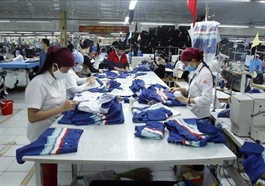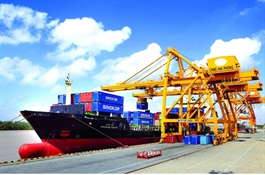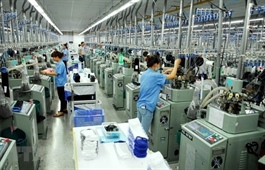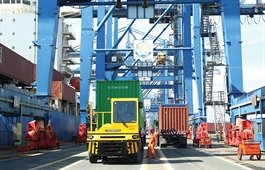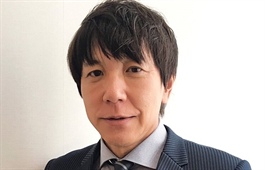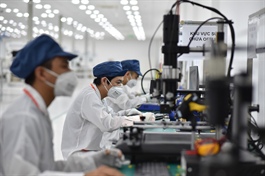Levelling the playing field to raise business competition
Levelling the playing field to raise business competition
Vietnam is boosting the reform of its state-owned enterprises (SOEs) in order to make them more competitive. Raymond Mallon, an economist based in Hanoi since 1991, discusses the need for SOE reforms to focus on the national benefit, with some references to international experiences.

Raymond Mallon - an economist
|
SOEs are major providers of essential public services, such as water, electricity, transport infrastructure, and communications and financial services in Vietnam. Government policy (No.58/2016/QD-TTg released in 2016 on criteria for classification of state enterprises and SOEs) is to retain 100 per cent ownership in SOEs which conduct business in “important and sensitive sectors” including: electricity distribution, aeronautical traffic and information services, search and rescue, postal services, lotteries, printing and manufacturing of notes and gold bullion, finance for socio-economic development, and banking system services.
The 2020 Law on Enterprises has broadened the definition of SOEs to include all enterprises with more than 50 per cent state ownership. Importantly for future equitisation, the new law also provides greater protection for minority shareholders.
Most Organisation for Economic Co-operation and Development (OECD) governments control SOEs that undertake commercial activities in energy, rail transport, finance, and telecoms sectors. A 2020 OECD study found that SOEs have been among the largest and fastest expanding multinational companies in the past two decades. The International Monetary Fund last year reported that about 20 per cent of the largest globally listed firms are SOEs (up from about 10 per cent in 2011).
The OECD also notes that, despite risks, this trend may accelerate as governments, in response to the COVID-19 crisis, introduce a mix of policy measures to support businesses, including buying equity in distressed private companies. In contrast, the share of SOEs in the Vietnamese economy has declined in recent years as domestic private enterprises and foreign-invested enterprises have expanded rapidly.
The role of SOEs in Vietnam differs from many OECD countries in that SOEs also play significant roles in some real estate, construction, and manufacturing subsectors. While over 96 per cent of all enterprises in Vietnam are domestic private firms, seven out of the top 10 largest companies are majority state owned. Thus, ensuring these SOEs are competitive and efficient will be increasingly critical in ensuring the delivery of quality public services in Vietnam, as well as for broader economic competitiveness and development.
Global experience has shown that, while it is possible to manage SOEs efficiently, both developed and developing countries have been struggling to effectively manage SOEs. And preferential treatment of SOEs, such as preferential access to capital and land, have often constrained private sector development.
If not managed well, SOEs can waste public resources, divert funds away from productive activities, and hinder socioeconomic development. This can undermine economic performance and public confidence in the state sector.
Studies from the Vietnamese National Assembly and the government have found that Vietnam has not been immune from challenges in SOE management and authorities have taken steps to formulate and implement reforms to improve performance.
Serving the public interests
The overarching questions in determining SOE policy should be: “Does state ownership advance the national interest, or could national interests be better served via alternative policy measures?”
The OECD argues that in countries where SOEs are subject to the same market pressures as their competitors and are insulated from political interference, SOEs can perform as well as private firms. OECD argues that, when governed transparently and efficiently, SOEs can correct market failures and improve public service delivery. It further notes, “in economies with less developed private sectors, SOEs can be an important source of employment and job training”.
The OECD Guidelines on Corporate Governance of SOEs (2015) stress that governments should exercise the ownership of SOEs in the interest of the general public. The guidelines aim to ensure that SOEs and privately-owned firms operate on a level playing field, to ensure that they are insulated from political pressures and are subject to the same market discipline faced by private companies.
The OECD recommends that governments should disclose the policy objectives that justify state ownership, and that SOEs should be subject to the same high-quality accounting, disclosure, compliance, and auditing standards as companies listed on the stock market, and that state and non-state shareholders should be treated equally. Boards of the SOEs should have the authority, competencies, and objectivity to provide strategic guidance and monitoring of management, and that the state should not interfere with day-to-day SOE management.
SOEs should also not be exempt from the application of laws (especially those on companies, competition, and bankruptcy) and regulations that apply to private firms, and should not receive preferential treatment (for example, preferences in public procurement, access to finance, land, technology or other resources at preferential terms, or more advantageous tax regimes). SOEs should also enforce a clear separation between commercial and non-commercial activities and be guaranteed adequate and transparent compensation for their public service objectives.
In line with good practices, the Vietnamese government has acted to separate its ownership and regulatory functions, establishing the Commission for the Management of State Capital at Enterprises (CMSC) at the end of 2018 to exercise ownership of major SOE groups (the 19 large SOE groups including State Capital Investment Corporation, PetroVietnam, Vietnam Electricity, and Petrolimex). This is a step towards reducing potential conflicts of interest in sectors where the government is both an owner and a regulator of enterprises.
Separating ownership and regulation responsibilities can help level the playing field and enhance competition between enterprises, regardless of their ownership. The establishment of a dedicated ownership agency, empowered to monitor and dismiss chairpersons and/or directors who fail to perform, regardless of their status can help provide greater incentives for SOE management to act in the national interest.
The establishment of the CMSC is in line with other successful regional efforts to strengthen the corporate governance of other SOEs. Singapore’s Temasek was established to exercise ownership of SOEs. Temasek is incorporated as a holding company for Singaporean sovereign investments in commercial enterprises and functions as a commercial investment company paying taxes and dividends to the Singaporean government (its sole owner).
Key policy challenges
The ongoing challenge for the CMSC is to continue to strengthen its capacity with sufficient numbers of suitably qualified and professional independent experts to work with the ownership agency to professionally manage its assets to maximise performance and returns and to manage financial and other risks. Systems and personnel need to be developed to provide more transparent reporting, benchmarking, and other accountability mechanisms.
The CMSC also needs to be able to mobilise professionals to serve on the SOE boards. More broadly, there is a need to accelerate efforts to train corporate governance experts and to build a corporate governance profession in Vietnam.
Vietnam’s Institute of Directors (VIOD) was established in 2018 as a professional organisation to promote corporate governance standards and best practices in the Vietnamese corporate sector. This is a potentially important step towards building the national capacity needed to strengthen corporate governance in Vietnam.
In Australia, the Australian Institute for Company Directors play a critical role in this area. Cooperation between VIOD and similar regional director training and advisory institutes will be one approach to building national capacity.
Another key policy challenge is to promote competitive neutrality to ensure that SOEs compete on equal footing with private enterprises. The principle of competitive neutrality has been a cornerstone of Australian SOE and competition policy reforms. Many of Vietnam’s recent economic reforms have been moving in this direction.
SOEs are now governed subject to the same Law on Enterprises and must comply with the Law on Competition and other legislation aimed at promoting the development of competitive markets. In this respect, Vietnam has moved further towards good practice than some OECD countries. Roughly a quarter of OECD countries still have SOEs with a legal status that shield them from the full application of private company laws.
Vietnam’s telecommunication sector provides an example of how well-regulated competitive markets can foster innovation and improvements in the quality of public services, even when the competition is mainly between different SOEs. While remaining largely state owned, Vietnam’s telecommunications sector has transformed from one of the most rudimentary systems in Southeast Asia in the mid-1980s to one of the more dynamic sectors with comparatively high levels of access to quality low-cost telecommunications and internet services.







